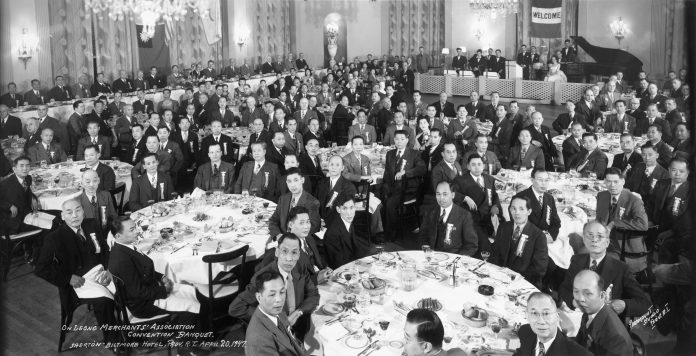
PROVIDENCE – In the 1950s, Lilian Chin Godin grew up in a now-nonexistent, three-story mill building at 6 Warner’s Lane in downtown Providence, right above her family’s grocery store. Godin’s home and the grocery store also shared the space with the On Leong Chinese Merchants Association headquarters – a national organization for Chinese business leaders with local chapters throughout the country. Her father, Chin Kwong You, also known as Chin Too, would eventually become the national president of On Leong.
From Weybosset Street to Washington Street, large window displays detail history and stories, such as Godin’s, that paint a picture of what Providence’s Chinatown used to be. The displays are part of a larger project on Providence’s Chinatown, hosted by the John Nicholas Brown Center for Public Humanities and Cultural Heritage at Brown University. Along with the window displays, the project also features an exhibit at the State Archives building and a series of events that includes a concert, film screening and walking tours.
The project came together when co-curators Angela Feng and Julieanne Fontana, both graduate students at Brown, teamed up with Brown Visiting Scholar John Eng-Wong and associate professor of American studies Robert Lee to conduct research on Providence’s Chinatown last spring. Together, the team held a community event for the Chinese community where they asked people for stories, and archival material such as photos and documents, to help with the project.
“We know that the community is excited. They want to learn more about their family history,“ Feng told PBN. “They have this interest in preserving and rediscovering their parents’ and grandparents’ stories.”
In addition to material from those with connections to Providence’s Chinatown, Eng-Wong told PBN the team was also able to get a better sense of Providence’s Chinatown through the transcripts of exit interviews from when Chinese individuals and families were going back to China during the era of the Chinese Exclusion Act.
With those transcripts, “you could also get some sense of the texture of their lives, description of restaurants, business that the Chinese were conducting during that time,” Eng-Wong said.
With all the material they gathered, the team was inspired by a 2016 exhibition in Boston by Tufts University, “These Words: A Century of Print, Writing, and Reading in Boston’s Chinese Community,” to share the stories they uncovered in the form of large window displays.
“It’s fulfilling to tell a story that’s been forgotten,” Eng-Wong said. “You think it was not worth remembering it in the first place. … Some were really sad. Some were really surprising in terms of the stories that were spun. I think it reconfirms a lot of what we know already and [have] known for decades about the oppression that many of these individuals experienced.”
For more information about the Providence’s Chinatown exhibit, visit richinesehistory.com. The exhibit will take place until May 31. A list of the exhibit’s events are below.
Providence’s Chinatown Tour at Encuentro 2018
Encuentro 2018 will feature a walking tour of Providence’s Chinatown as part of a conference on heritage and historic preservation on April 28. For tickets and more information, visit preservationconferenceri.com.
Providence’s Chinatown Concert
No-No Boy is a multimedia concert performed by Julian Saporiti and Erin Aoyama based on stories of the Asian-American experience. The group will debut a new song on Providence’s Chinatown at this performance on April 28, from 2:30-3:30 p.m., at AS220 Main Stage, 115 Empire St., Providence. The event is free and open to the public. More information is available here.
Walking Tour and Film Screening
A guided walking tour of Providence’s Chinatown and lunch with the curators will take place on May 12 from 12-2 p.m. Cost is $25 and registration is required.
A film screening of “The Chinese Exclusion Act” followed by a panel discussion will be held on May 12, from 3-4:30 p.m. in the Paff Auditorium at the University of Rhode Island Providence campus, 80 Washington St., Providence. It is free and open to the public. Register here.
Lauren Aratani is a PBN contributing writer.










